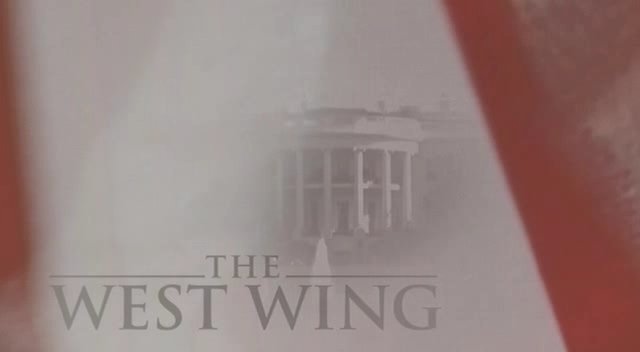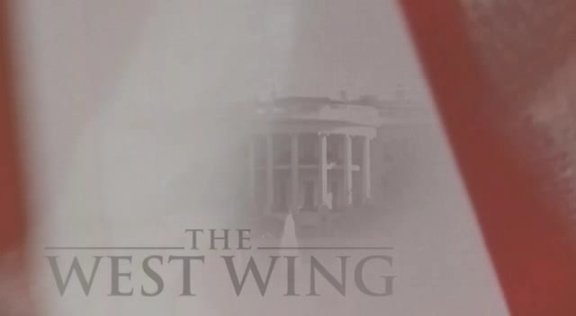If you’d like to check out previous posts in this series, visit the Surveillance Summer Watch page.
It’s been a long time since I’ve written about my West Wing viewing and that makes me sad. I haven’t watched a whole lot of West Wing lately, and that also makes me sad. That is especially disappointing when I’m in season two of the series, a time when it is clearly becoming more confident in its ability to tell stories that while on the surface seem political and talky, tell us a whole lot about the characters doing the politicking and the talking.
At the end of the first season, many of the major members of the Bartlett administration found themselves at the mercy of white supremacist gunmen. Although no one ends up with lifelong damage (i.e. dead), Josh is the most seriously injured by the shootings and everyone’s concern from him shoots the story into flashbacks about how the figurative band came together. Said flashbacks and the emotional reactions to Josh’s condition — most notably Donna’s — make the two-part, “In the Shadow of Two Gunman” episode my favorite West Wing efforts thus far.
It’s odd to see the group of people separated, in different jobs and not even thinking about working for Josiah Bartlett, and even know the flashbacks are clearly leading to decisions where they do, the scenes are not any less exciting. Sam, Josh and CJ are working jobs that they don’t really care about, Toby’s stuck being the only smart person on the Bartlett campaign and Leo knows that he only needs one Bartlett speech to go the right way for the ball to get rollin’. Although there’s some of the already-classic West Wing good/bad line drawing with Sam’s old job, the scene with him continuously speaking up against his client and then noticing Josh grinning outside the office is perhaps my favorite moment of the two hours.
The flashbacks also tell us a lot about the relationship between Leo and not-yet President Bartlett. Jed is clearly set on doing things his way, the same way he became governor in his own state, with the same people. But it’s not working. Those people are small time and small-minded, unable to wrap their heads around the big ideas that Toby and Leo have for Bartlett. Again, sometimes it feels like people on this series are painted as bad guys just because they have bad ideas, but eventually it leads to Bartlett realizing that he needs to Leo do what he does best. Throughout the first season, we mostly saw Bartlett as man with lots of high-caliber answers and opinions to the problems that the staff would wonder about for an entire episode. But here, he’s confused, stubborn and just about to lose a chance at the probable most important job in the world.
Interestingly, the events of those first two episodes confirm what viewers already knew by the middle of season one: Josh Lyman is the heart and soul of this series. Here, he’s the one who is in the most danger. He’s the one with the best arc in the flashback. And he gets to share the most important scene of the flashback with Bartlett when they discuss his father’s death and the future of the campaign. There, Bartlett is willing to skip a victory speech so he can attend the funeral for Josh’s father and all the hardship we’ve seen in the FB are washed away and the relationship we know between Josh and Jed begins. It’s beautiful.
Meanwhile, the following batch of episodes — I’m through 2.07 so far — do give the former center of the series Sam Seaborn lots of good material. Amid the sea of despair that occurs in the first two episodes of the season, there are a number of humorous moments in subsequent episodes and it seems like Sam is in the middle of many of those. I don’t know if maybe Aaron Sorkin told Rob Lowe to play Sam a little differently or it’s just Lowe growing into the role, but he feels more confident and playful as Sam instead of self-important. And of course, he gets to be a major bad ass in the firing episode.
Most of that stems from the introduction of Ainsley, a blonde, republican talking head who wipes the floor with him on television. I think Ainsley is a nice introduction to the staff despite the idea that the Bartlett administration is so forward thinking for hiring her — we get it, they’re cool — and it allows the series to be critical of the characters without seeming too demeaning or anything. The series spends most of its time celebrating how great these people are at talking and helping people, but by bringing in Ainsely, we have a perspective that sees through some of the hyperbole and makes us realize as viewers realize that’s it is still all politics. However, through seven episodes, it seems like she’s already pushed into the fabric of the team so much that she isn’t as antagonistic as she could or should be. I don’t know as if there’s the indication that she’s “turned” or something, but aside from the obvious sexual tension between she and Sam, I don’t feel like Ainsley is being used as well as she could be.
The events in episodes 3 through 7 feels like an attempt at re-building a status quo within the White House, but outside events keep de-railing that. I’m intrigued to see how these wonderful characters continue to react to it, despite the sometimes obvious execution.
Major issues tackled in these episodes: Gay rights, education, political coups


Leave a comment